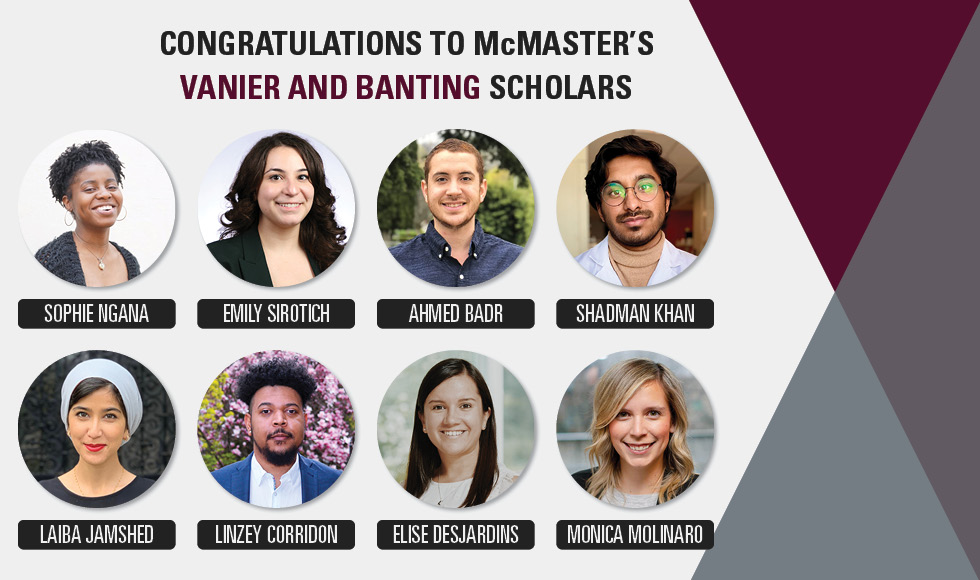Vanier and Banting scholars recognized for their innovative research

BY Mary Taws
July 15, 2021
Seven graduate students have been awarded the Vanier Canada Graduate Scholarship. Each will receive $50,000 a year, for up to three years. Learn more about the recipients of this prestigious award below.
Sophie Ngana, Biochemistry and biomedical sciences
 Ngana’s research focuses on Parkinson’s Disease (PD), a movement disorder resulting from the loss (neurodegeneration) of dopamine-producing neurons in the brain. Ngana’s work explores microbiota bacteria as an environmental factor of PD, and determining if, and how, alterations in the microbiota contribute to the development of this disorder. The overall goal of this research is to identify possible interventions to slow or stop the neurodegenerative process.
Ngana’s research focuses on Parkinson’s Disease (PD), a movement disorder resulting from the loss (neurodegeneration) of dopamine-producing neurons in the brain. Ngana’s work explores microbiota bacteria as an environmental factor of PD, and determining if, and how, alterations in the microbiota contribute to the development of this disorder. The overall goal of this research is to identify possible interventions to slow or stop the neurodegenerative process.
As she earns this recognition, Ngana would like to thank her family and friends for their continued support. “I would not be where I am without you all,” she says. “I would also like to thank Drs. Lorraine and Suneil Kalia for their encouragement and support throughout my undergrad and my PI Dr. Lesley MacNeil for her continued support on the project and for being the best PI a girl could ask for.”
Emily Sirotich, Health research methods, evidence and impact
S irotich’s PhD thesis aims to create evidence-based guidelines addressing the lack of treatment protocols for bleeding emergencies in patients with immune thrombocytopenia (ITP), a rare autoimmune disease that can result in severe bleeding. This research could also be applied to guidelines for other rare conditions. “Thank you to my supervisors, the HEI department, and McMaster for their support, guidance and resources in achieving Canada’s most prestigious academic doctoral award,” says Sirotich. “This award will help further my research to develop recommendations for rare diseases that may have been impossible due to limited evidence.”
irotich’s PhD thesis aims to create evidence-based guidelines addressing the lack of treatment protocols for bleeding emergencies in patients with immune thrombocytopenia (ITP), a rare autoimmune disease that can result in severe bleeding. This research could also be applied to guidelines for other rare conditions. “Thank you to my supervisors, the HEI department, and McMaster for their support, guidance and resources in achieving Canada’s most prestigious academic doctoral award,” says Sirotich. “This award will help further my research to develop recommendations for rare diseases that may have been impossible due to limited evidence.”
Ahmed Badr, Civil and mechanical engineering
 Badr’s work models dams as a mechanism for predicting and mitigating the impacts of climate change. With five Canadian provinces and territories relying on hydroelectric power for more than 85% of their total electricity consumption, and over 15,000 dams of various sizes across the country, resiliency of these complex systems is paramount. Badr’s project investigates how a system impacted by climate change can be used to influence climate change.
Badr’s work models dams as a mechanism for predicting and mitigating the impacts of climate change. With five Canadian provinces and territories relying on hydroelectric power for more than 85% of their total electricity consumption, and over 15,000 dams of various sizes across the country, resiliency of these complex systems is paramount. Badr’s project investigates how a system impacted by climate change can be used to influence climate change.
“Uncertainty caused by climate change presents safety concerns for dams,” said Badr, “We want to help ensure the safety of people and ecosystems upstream and downstream of Canadian dams while giving governments and hydropower operators the information they need to plan and manage dams.
Shadman Khan, Biomedical engineering
 Khan is investigating new biomaterials that aim to improve food safety and reduce waste in the food industry. His research is part of a project between McMaster University and Toyota Tsusho Canada Inc (TTCI) that is developing a bacteria-detecting patch that can indicate when food is contaminated by pathogens, including strains of E. coli and Salmonella.
Khan is investigating new biomaterials that aim to improve food safety and reduce waste in the food industry. His research is part of a project between McMaster University and Toyota Tsusho Canada Inc (TTCI) that is developing a bacteria-detecting patch that can indicate when food is contaminated by pathogens, including strains of E. coli and Salmonella.
“I’m very grateful to be receiving this award,” says Khan. “I’m working under the mentorship of excellent scholars and researchers, and to be awarded this scholarship makes me believe that I really belong in this line of work.”
Laiba Jamshed, Plant and animal biology
 Jamshed is studying the adverse effects of exposure to oil and gas extraction chemicals on local Indigenous communities and wildlife in Northern Alberta. More specifically, she is exploring a potential cross-species (birds, mammals, fish) biomarker to explain the metabolic toxicity of these petroleum-derived chemicals.
Jamshed is studying the adverse effects of exposure to oil and gas extraction chemicals on local Indigenous communities and wildlife in Northern Alberta. More specifically, she is exploring a potential cross-species (birds, mammals, fish) biomarker to explain the metabolic toxicity of these petroleum-derived chemicals.
This marker would aid in assessing overall wildlife health and determine whether further regulations are warranted to protect Indigenous communities that rely on a healthy environment and ecosystem to exercise their socio-cultural traditions.
“I’m incredibly passionate about this work because it serves to mitigate the adverse health effects faced by a marginalized subset of our population,” says Jamshed. “It is so important that conversations are happening, being supported by environmental data, and healthy public policy is being put into place for all people and not just those that live in larger urbanized centres.”
Linzey Corridon, English and Cultural studies
 Situated at the intersections of Caribbean Studies, Queer Theory, Policy Studies, Sexuality Studies, and Literary Criticism, Corridon’s work explores how we might reframe inadequate discourses on the queer Caribbean and diaspora. Corridon is also developing a bibliography and interactive-map project of queer Caribbean and diaspora writings that further documents and visualizes this very nuanced queer experience.
Situated at the intersections of Caribbean Studies, Queer Theory, Policy Studies, Sexuality Studies, and Literary Criticism, Corridon’s work explores how we might reframe inadequate discourses on the queer Caribbean and diaspora. Corridon is also developing a bibliography and interactive-map project of queer Caribbean and diaspora writings that further documents and visualizes this very nuanced queer experience.
As Corridon advances his research, he extends his gratitude and thanks to his previous home institution and the department of English at Concordia University for allowing him the space to begin thinking about his research, and to McMaster’s department of English and cultural studies and the Lewis and Ruth Centre for Digital Scholarship for supporting his doctoral work.
“I’m humbled by the rich histories of queer West Indian peoples, writing and scholarship that make my research possible,” says Corridon. “You are with me always.”
Elise Desjardins, Urban planning
 Many cities in Canada, including Hamilton, have invested in resources to increase active school travel, but less is also known about the potential of built environment changes to increase children’s independent mobility to other local destinations and whether such changes can improve their wellbeing. Desjardins’ research examines the influence of built environment interventions in Hamilton on children’s active travel, independent mobility and wellbeing.
Many cities in Canada, including Hamilton, have invested in resources to increase active school travel, but less is also known about the potential of built environment changes to increase children’s independent mobility to other local destinations and whether such changes can improve their wellbeing. Desjardins’ research examines the influence of built environment interventions in Hamilton on children’s active travel, independent mobility and wellbeing.
“I hope that my research will inform future interventions to make neighbourhoods and infrastructure safer and more oriented for children to travel independently to a variety of destinations, not just school, that are important for their wellbeing,” says Desjardins. “My sincere thanks to the School of Earth, Environment & Society, my supervisor, Dr. Antonio Paez, and to SSHRC for this award, which will enable me to collaboratively pursue this research with community partners.”
—
At the same time, McMaster student Monica Molinaro has received the Banting Postdoctoral Fellowship, worth $70,000 a year for up to two years.
Monica Molinaro, Health equity in primary care
 Molinaro earned an honours bachelor of life sciences degree from McMaster in 2014. She went on to complete a master of science in kinesiology from Wilfrid Laurier University and a doctorate in health and rehabilitation sciences from Western University. Through her research, Molinaro will explore provider and patient experiences of health inequity in primary care.
Molinaro earned an honours bachelor of life sciences degree from McMaster in 2014. She went on to complete a master of science in kinesiology from Wilfrid Laurier University and a doctorate in health and rehabilitation sciences from Western University. Through her research, Molinaro will explore provider and patient experiences of health inequity in primary care.
“The COVID-19 pandemic has highlighted the relationship between health outcomes and social inequity experienced by Canadians,” says Molinaro. “At the same time, there has been an increased attention to the daily challenges of health care providers, including moral distress and mental well-being.”


